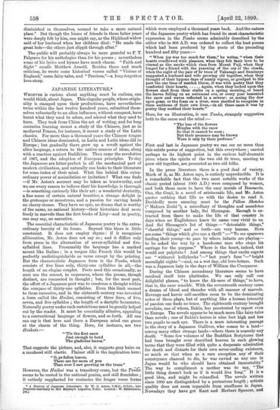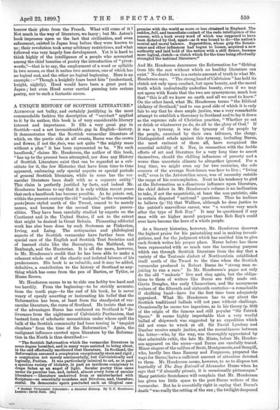JAPANESE LITERATURE.* WaoEviur is curious about anything must be curious,
one would think, about Japan. This singular people, whose origin- ality is stamped upon their productions, have nevertheless twice within the last twelve hundred years, submitted them- selves voluntarily to an alien influence, without conquest, have burnt what they used to adore, and adored what they used to burn. They took from China the art of writing, and for long centuries learning meant a study of the Chinese, just as in medireval France, for instance, it meant a study of the Latin classics. For more than a thousand years the Chinese tongue and Chinese ideas dominated, as Latin and Latin ideas did in Europe ; but gradually there grew up a revolt against the alien language, a return to the native sources of ideas, along with a reaction against Buddhism. Then came the revolution of 1867, and the adoption of European principles. To-day the Japanese are letter-perfect in all the mechanical part of modern civilisation, and naturally one looks to their literature for some index of their mind. What lies behind this extra- ordinary power of assimilation or imitation What one finds —if Mr. Aston's account may be taken as trustworthy, and we see every reason to believe thatl his knowledge is thorough —is something curiously like their art: a wonderful dexterity, a fine sense of certain natural beauties, a strange delight in the grotesque or monstrous, and a passion for carving heads on cherry-stones. They have no epic, no drama that is worthy of the name, no national history—their historians deal more freely in marvels than the first books of Livy—and in 'poetry, one may say, no narrative.
The essential characteristic of Japanese poetry is the extra- ordinary brevity of its forms. Beyond this there is little constraint. It does not employ rhyme : if it recognises alliteration, Mr. Aston does not say so ; and it differs only from prose in the alternation of seven-syllabled and five- syllabled lines. Presumably the language has a marked accent like Italian ; in a tongue like French this would be perfectly undisting-uishable as verse except by the printing. But the characteristic Japanese form is the Tanka, which consists of five lines only, thirty-one syllables in all,—the length of an elegiac couplet. Poets used this occasionally, as ours use the sonnet, in sequences, where the poems, though distinct, are connected in thought ; but, for the most part, the effort of a Japanese poet was to condense a thought within the compass of thirty-one syllables. Even this limit seemed to them excessive, and in the sixteenth century was invented a form called the Haikai, consisting of three lines, of five, seven, and five syllables ; the length of a dactylic hexameter. Naturally poetry under such restrictions must be greatly helped out by the reader. It must be essentially allusive, appealing to a conventional language of flowers, and so forth. All one can say is that here and there a European mind can guess at the charm of the thing. Here, for instance, are two Haikais.—
"Tis the first snow Just enough to bend The gladiolus leaves."
That suggests the picture, and, also, it suggests grey hairs. on a manhood still elastic. Plainer still is the implication here: "0, ye fallen leaves,
There are far more of you
Than ever I saw growing on the trees."
However, the Haikai was a transitory craze, but the Tatlra seems to be rooted in the national genius, and still flourishes ; it entirely supplanted for centuries the longer verse forms • A History of Japanese Literature. By W. G. Aston, C.M.G., D.Litt., late Japanese Secretary to Her Majesty's Legation, Tokio. London : W. Heinemann. teal which were employed a thousand years back. And the nature of the Japanese poetry which has found its most characteristic expression in the Tanka seems admirably described by the editor who in 905 A.D. was ordered to collect the best poems which had been produced by the poets of the preceding hundred and fifty years :— " When joy was too much for them," he writes, "when their hearts overflowed with pleasure, when they felt their love to be eternal as the smoke which rises from Mount Fuji, when they longed for a friend with the yearning of the cry of the cicada, when the sight of the pair of fir trees of Takasago and Suminoye suggested a husband and wife growing old together, when they thought of their bygone days of manly vigour, or grudged to the past the one time of maiden bloom, it was with poetry that they
comforted their hearts Again, when they looked upon the flowers shed from their stalks on a spring morning, or heard the leaves falling on an autumnal eve, or every year lamented the snow and waves reflected in a mirror; or, seeing the dew upon grass or the foam on a river, were startled to recognise in them emblems of their own lives,—in all these cases it was by poetry they soothed their hearts."
Here, for an illustration, is one Tanka, strangely suggestive both to the sense and the mind :— " The hue of the flowers
Mingles with the snow $o that it cannot be seen ; But their presence may be known Were it only by their perfume."
First and last in Japanese poetry we can see no more than this subtle power of suggestion, but this everywhere ; carried perhaps to its highest point in the curious half-dramatic piece where the spirits of the two old fir trees, meeting to grow old together, are presented as two old folks.
In the prose literature there is a good deal of variety. Much of it, as Mr. Aston says, is entirely unproducible. It is a remarkable fact that the two most notable works of the classic period (about 1000 A.D.) were composed by women, and both these seem to have the easy morals of Boccaccio.
One, the Genii, is a novel of aristocratic life, and Mr. .Aston quotes nothing that fills us with the desire to read it. Decidedly more amusing must be the Pillow Sketches (" Makura Zoshi "), a miscellany of thoughts and anecdotes composed by another lady, Sei Shonagon. Enough is ex- tracted from these to make the life of that country in days when no Englishman knew its name very vivid to us.
And Sei Shonagon's list of things — "detestable things," "cheerful things," and so forth—are very human. Here are some "things which give one a thrill " :—" To see sparrows feeding their young—to pass by where infants are playing— to be asked the way by a handsome man who stops his carriage for the purpose." Where is the heart, indeed, that would not palpitate And among things that excite regrets are "withered hollyhocks "—" last year's fans "—" bright moonlight nights "—and, on a wet day, old love-letters. Such was a Japanese lady in the days of William the Conqueror.
During the Chinese ascendency literature seems to have resolved itself into platitudes. We can only cull one delightful phrase, "to know the Ah-ness of things," to have, that is, the cceur sensible. With the seventeenth century came a drama of blood and thunder with all manner of marvels. Revenge and heroic self-sacrifice seem to be the dominating notes of these plays, but of anything like a human intensity of passion one finds no trace. The eighteenth century brought novelists, one of whom, Bakin, has penetrated by report even to Europe. The novels appear to be much more like fairy-tales than novels ; one of Bakin's heroes is nine feet high and has two pupils to each eye. There is a more interesting passage in the story of a Japanese Gulliver, who comes to a land— among many other strange lands—where there is scarcely any death. "Some few volumes of the Buddhist Scriptures that had been brought over described heaven in such glowing terms that they were filled with quite a desperate admiration for death and distaste for their own never-ending existence, so much so that when as a rare exception any of their countrymen chanced to die, he was envied as any one in Japan would be who should have obtained immortality." The way to compliment a mother was to say, "The little thing doesn't look as if it would live long." It is a good idea, and might be rehandlecL The novels written since 1800 are distinguished by a portentous length ; artistic quality does not seem separable from smallness in Japan. Nowadays they have got Kant and Herbert Spencer, and borrow their plots from the French. What will come of it I Not much in the way of literature, we fancy ; but Mr. Aston's book impresses upon us the fact that civilisation, and even refinement, existed in Japan long before they were known to ; their revolution took away arbitrary restrictions, and what followed was very largely free development. Yet it is hard to think highly of the intelligence of a people who accounted among the chief beauties of poetry the introduction of "pivot- words,"—that is to say, the employment of a word or syllable in two senses, so that it unites two sentences, one of which has no logical end, and the other no logical beginning. Here is an example :—" Though a knightly fears beset him" (understand, knights nightly). Hood would have been a great poet in Japan ; but even Hood never carried punning into serious .poetry, nor to such a fantastic excess.







































 Previous page
Previous page